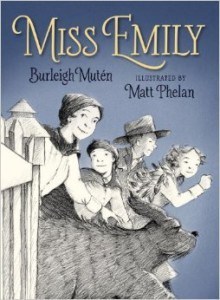Miss Emily and Invoking the Past in Verse
Miss Emily by Burleigh Mutén begins with a two children galloping on imaginary horses, meeting up at the woodpile, “where all good plans are made.” Soon four children stretch and slither like slugs to meet their neighbor who kneels near the Great Pink Bush. Instantly we feel within a child’s world. The theme of imagination and its joys is found in more escapades that will hold children’s attention while they’re welcomed to poetry. Miss Emily has fun with metaphors, riddles, and occasional long, Latinate words, which are sometimes capitalized, as in some Emily Dickinson poems, but here feel more fun than serious – or is this just Serious Fun? Maybe it doesn’t matter, just as in the book lines cross between pretend and true, a blurring suggested by Matt Phelan’s charming graphite drawings.
I love this novel for young readers, and it’s always a pleasure to see a friend’s work find its long way into covers. And what lovely covers these are: thank you Candlewick Press, which offers a teachers guide and author notes! Burleigh and I have shared precious conversations about poetry, from its genesis to marketing, over meals and walks around Amherst. I have a recent memory of her saying, “Don’t you just love to make line breaks?” Her smile pushed up her bright cheeks, and of course I said yes. A few years ago, she invited me to her house, where she’d set bread and cheese on her wooden table with a view of the woods, and we planned a workshop about invoking people from the past. Our workshop was turned down, but we had a memorable afternoon talking about, among other things, how first she decided to write about Emily Dickinson’s playful side, and then decided to put the narrative in verse. She felt some fear but mostly joy to reconnect with an inner poet she’d known in her teens, but abandoned for a while.
“It is hard to own being a poet,” I found in my notes from that afternoon. Here are a few more:Line breaks as places of power. Literature moves fastest through dialogue. The chutzpah and humility to speak for someone from the past. You have to be open, like in meditation. Go beyond facts or legends through imagination, its compassion. To play is to take a chance. I like the language of incantation, but prefer that people not think I’m too swoony or over the bend. Feels all about listening. Writing is about confidence and uncertainty, faith and disbelief, forging ahead and hesitation. Linger on details. I care more about potatoes than divorce.
There’s a lot more. I’m not sure what I said or what Burleigh said, and it didn’t matter at the time. All of it still makes sense to me, except the potatoes and divorce allusion – which of us said that? –though I do tend to obsess more about what’s on a table than abstractions. And am very fond of potatoes.
For more Poetry Friday posts, visit Mary Lee at A Year of Reading.






